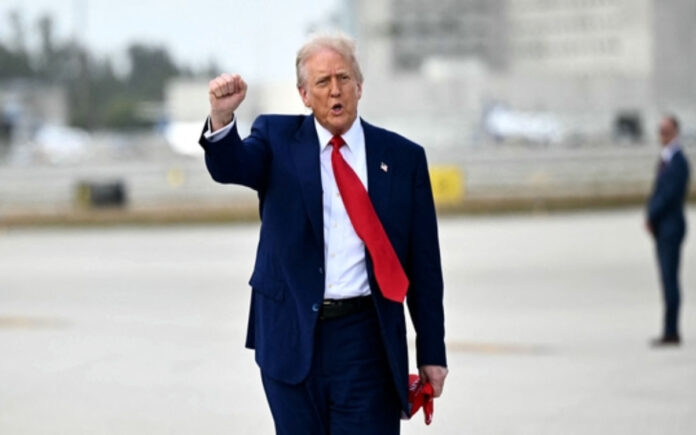Washington: The U.S. Supreme Court has authorized former President Donald Trump to move forward with the deportation of alleged Venezuelan gang members under the 1798 Alien Enemies Act, a rarely used wartime-era law. However, the ruling—delivered in a narrow 5-4 vote—imposes judicial checks on the administration’s efforts, particularly around the procedural rights of detainees.
The unsigned opinion, backed by the court’s conservative bloc, overturned an earlier order by U.S. District Judge James Boasberg, who had blocked the deportations on March 15. Boasberg’s decision halted removals while legal challenges progressed, citing concerns over due process.
Though the justices permitted deportations to continue, the ruling emphasized that detainees must be given a fair opportunity to seek legal redress before removal. “Detainees must receive notice after the date of this order that they are subject to removal under the Act. The notice must be afforded within a reasonable time and in such a manner as will allow them to actually seek habeas relief in the proper venue before such removal occurs,” the court stated.
Despite the court’s 6-3 conservative majority, Justice Amy Coney Barrett joined the three liberal justices in dissenting.
The Trump administration has maintained that Judge Boasberg’s ruling intruded on presidential authority in national security matters.
“The Supreme Court has upheld the Rule of Law in our Nation by allowing a President, whoever that may be, to be able to secure our Borders, and protect our families and our Country, itself,” Trump wrote on social media.
Trump invoked the Alien Enemies Act in March to expedite the deportation of individuals allegedly affiliated with the Tren de Aragua gang. The law, which allows the president to detain, deport, or impose restrictions on individuals deemed national security threats during wartime, was last notably used to intern Japanese, Italian, and German nationals during World War II.
The court clarified that legal challenges to such deportations must be filed in the district where a detainee is held—not in the District of Columbia, where the current litigation originated. In this case, the court ruled that Texas was the appropriate venue.
Importantly, the justices declined to address the legality of the administration’s use of the Alien Enemies Act in this context. “The plaintiffs challenge the government’s interpretation of the Act and assert that they do not fall within the category of removable alien enemies. But we do not reach those arguments,” the ruling noted.
The legal battle was brought forth by a group of Venezuelan men held by immigration authorities, represented by the American Civil Liberties Union (ACLU). The plaintiffs argued that Trump’s directive exceeded presidential authority since the Alien Enemies Act applies only when the U.S. is formally at war or has been invaded.
Due Process Emphasized
Lee Gelernt, the ACLU lawyer representing the detainees, welcomed the ruling despite the setback on venue.
“This ruling means we will need to start the court process over again in a different venue, but the critical point is that the Supreme Court said individuals must be given due process to challenge their removal under the Alien Enemies Act. That is a huge victory,” Gelernt said.
In a sharp dissent, Justice Sonia Sotomayor criticized the majority’s approach and the speed of the ruling, describing their reasoning as “dubious”. She wrote that courts reviewing such cases would inevitably need to scrutinize the government’s interpretation of what constitutes an “invasion” or “predatory incursion”, and whether specific individuals truly belong to groups like Tren de Aragua.
Also Read | Trump’s Tariff Shock Threatens Uptake of New Federal Buyout Offers
Sotomayor also raised alarms about the potential dangers of requiring detainees to file claims individually across disparate jurisdictions.
“That requirement may have life or death consequences,” she wrote, joined by Justices Elena Kagan and Ketanji Brown Jackson. Justice Barrett did not join this part of the dissent.
Flights, Defiance, and Political Fallout
Judge Boasberg, appointed by former President Barack Obama, had blocked deportations on March 15. However, the administration allowed two flights already en route to continue to El Salvador, where 238 Venezuelan men were handed over to be confined at the country’s “Terrorism Confinement Center”.
Boasberg later questioned whether the administration had defied his order. Justice Department lawyers countered that the flights had already exited U.S. airspace before his written order was issued and that an earlier oral instruction was not binding.
Also Read | Ottawa Blames WeChat Account for Disinformation Targeting Mark Carney
Trump responded to Boasberg’s ruling by calling for his impeachment, labeling him on social media as a “Radical Left Lunatic” and a “troublemaker and agitator”. The call for impeachment drew criticism, including from Chief Justice John Roberts.
This ruling is one of several recent Supreme Court decisions favoring Trump. On the same day, the court temporarily blocked a lower court order requiring the return of a Salvadoran man mistakenly deported. Days earlier, the court allowed the administration to implement budget cuts to teacher training grants as part of Trump’s broader rollback of diversity and inclusion initiatives.



